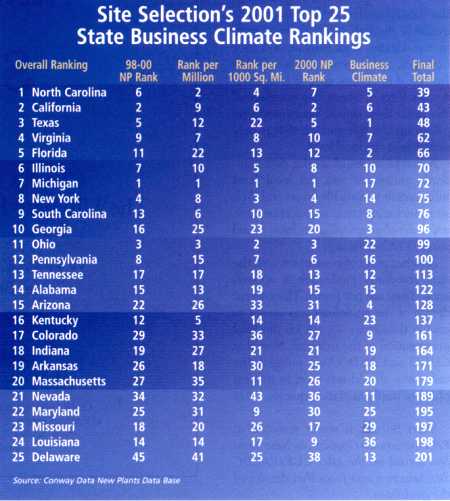Economic
Development
North Carolina's
business climate rated nation's best
Spearheaded
by the meteoric rise of the Charlotte and the Research Triangle metro
areas, North Carolina now enjoys the nation’s best business climate,
according to Site Selection
Magazine, a trade publication for
corporate relocation specialists. The state was ranked third last year
and vaulted to the top of the magazine’s rankings largely on the strength of business expansions and relocations during 2000, before
the current economic slowdown hit.
 The magazine said North Carolina barely edged out California, Texas,
Virginia and Florida for the top spot. The rankings are determined
from five criteria that include total new and expanded corporate
facilities for 2000; total new and expanded corporate facilities for
1998-2000; total new and expanded facilities per one million residents
for 1998-2000; total new and expanded facilities per 1,000 square
miles for 1998-2000; and results from the magazine’s annual survey
of corporate real estate executives who work for companies with
nationwide operations.
The magazine said North Carolina barely edged out California, Texas,
Virginia and Florida for the top spot. The rankings are determined
from five criteria that include total new and expanded corporate
facilities for 2000; total new and expanded corporate facilities for
1998-2000; total new and expanded facilities per one million residents
for 1998-2000; total new and expanded facilities per 1,000 square
miles for 1998-2000; and results from the magazine’s annual survey
of corporate real estate executives who work for companies with
nationwide operations.
The first four criteria account for 50 percent of the overall ranking,
with the fifth category — the executive survey — accounting for
the other 50 percent. North Carolina’s strong showing across the
board propelled it to the No. 1 position overall.
“This ranking demonstrates that we are doing the right things to
ensure long-term economic growth in North Carolina,” Gov. Mike
Easley said. “Our challenge is to make future growth translate into
good jobs for all of our families, and strong investments in all of
our communities.”
North Carolina recorded nearly $6.6 billion in corporate investments
in 2000, a 20 percent jump over 1999, according to state Commerce
Department data. Of the 730 announcements, 562 were expansions of
existing industries totaling more than $3.8 billion. The rest were
companies moving into the state and investing nearly $2.8 billion. The
bulk of that activity occurred in the Charlotte and RTP metro areas.
Foreign investment has also played a major role in North Carolina’s
recent economic growth. A 1999 study by the Organization for
International Investment found that between 1987 and 1997, the number
of state workers employed by U.S. subsidiaries of foreign companies
grew by 68 percent, from 134,000 to 225,000.
Foreign companies invested more than $952 million in North Carolina in
2000, accounting for more than 5,500 new jobs. German companies led
the way with over $397 million and more than 1,500 new jobs.
Businesses from the United Kingdom came in second with more than $189
million and more than 800 jobs.
North Carolina’s surge from third place last year to the top of this
year’s business climate rankings serves as further evidence that the
Southeastern U.S. is increasingly becoming the preferred location for
corporate America, the magazine said. Five of the top 10 states in
this year’s rankings are in the Southeast. Following North Carolina
are No. 4 Virginia, No. 5 Florida, No. 9 South Carolina and No. 10
Georgia. Last year, the Southeast placed four states in the top 10.
Also showing strong resilience in the face of a slowing U.S. economy
are the so-called “Rust Belt” states of Illinois (No. 6), Michigan
(No. 7), New York (No. 8), Ohio (No. 11), Pennsylvania (No. 12) and
Indiana (No. 18). Michigan, which has won Site Selection’s Governor
Cup award the last four years in a row as the state producing the
highest number of new and expanded facilities, finished 17th in the
executive survey this year but No. 1 in every other statistical
category.
Not to be outdone, several Western states made their marks on this
year’s business climate ranking. Led by No. 2 California, the West
also produced such stalwarts as Texas (No. 3), Arizona (No. 15),
Colorado (No. 17), Arkansas (No. 19) and Nevada (No. 21). Nevada,
interestingly, was ranked this year as the No. 1 place in America to
be an entrepreneur, according to a report by the Washington,
D.C.-based Small Business Survival Committee.
States that showed significant jumps in the overall business climate
rankings from last year were Virginia, which moved up from eighth
place in 2000 to fourth in 2001; Michigan, which jumped from 12th to
seventh; South Carolina, which jumped from 13th to ninth; Tennessee,
which jumped from 20th to 13th; and Alabama, which went from unranked
in 2000 (not in the top 25) to 14th in 2001. -- Steve Tuttle
Return to magazine index
|
|

